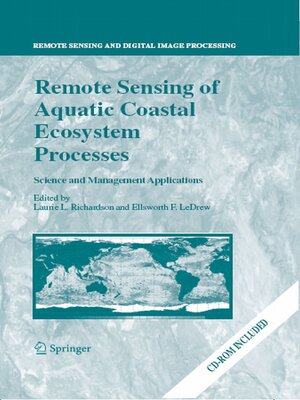Remote Sensing of Aquatic Coastal Ecosystem Processes
ebook ∣ Science and Management Applications · Remote Sensing and Digital Image Processing
By Laurie L. Richardson

Sign up to save your library
With an OverDrive account, you can save your favorite libraries for at-a-glance information about availability. Find out more about OverDrive accounts.
Find this title in Libby, the library reading app by OverDrive.



Search for a digital library with this title
Title found at these libraries:
| Loading... |
The aquatic coastal zone is one of the most challenging targets for environmental remote sensing. Properties such as bottom reflectance, spectrally diverse suspended sediments and phytoplankton communities, diverse benthic communities, and transient events that affect surface reflectance (coastal blooms, runoff, etc.) all combine to produce an optical complexity not seen in terrestrial or open ocean systems. Despite this complexity, remote sensing is proving to be an invaluable tool for "Case 2" waters. This book presents recent advances in coastal remote sensing with an emphasis on applied science and management. Case studies of the operational use of remote sensing in ecosystem studies, monitoring, and interfacing remote sensing/science/management are presented. Spectral signatures of phytoplankton and suspended sediments are discussed in detail with accompanying discussion of why blue water (Case 1) algorithms cannot be applied to Case 2 waters.
Audience
This book is targeted for scientists and managers interested in using remote sensing in the study or management of aquatic coastal environments. With only limited discussion of optics and theory presented in the book, such researchers might benefit from the detailed presentations of aquatic spectral signatures, and to operational management issues. While not specifically written for remote sensing scientists, it will prove to be a useful reference for this community for the current status of aquatic coastal remote sensing.






